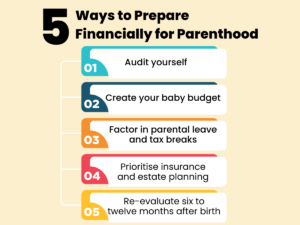Perhaps you are contemplating making your couple a family in the near future – or perhaps baby number one is already on the way. Congratulations! Preparing for parenthood is a rollercoaster ride of emotions – and also has the same effect on your finances. Supporting a small family is so much different to just supporting yourself, and you need to have financial structures in place so you aren’t caught short. Fundo knows a thing or two about finances, so we’ve put together five ways you can financially prepare for parenthood and stress less!
1. Audit yourself
You can’t win if you don’t keep score – and your first act as a to-be parent is to audit your finances as they stand. That means looking at your income, looking at your expenses and figuring out what needs to be shifted around to make room for your baby. Get your bank statements and go through them line by line. Use spreadsheets or special budgeting software – no matter how you do it, this needs doing.
2. Create your baby budget
Now that you’ve audited your finances, you have to factor in your baby. That means baby’s food, clothes, furniture, medical expenses, childcare, hospital stays, car seats, parenting or childbirth classes, insurance, and other bits and pieces that you’ll need such as nursery items and toys. One tip is to buy things second hand instead of brand new to keep prices down – and they could still come in handy if you decide on baby number two (or three!) Of course, you could incur unexpected and urgent baby expenses that blow the budget. In that case, it may make financial sense to take out a little loan to tide you over.
3. Factor in parental leave and tax breaks
Will you be a working family or will mum (or dad) want to take extended leave and take care of baby? In the course of your budgeting, you may want to factor in tax benefits and paid leave schemes to provide income; or you may want to pay for childcare and go back to work immediately. As long as you figure it out ahead of time and you can afford it comfortably, go for it!
4. Prioritise insurance and estate planning
Now that you have a dependent on the way, it’s important to prioritise life insurance, including Total & Permanent Disability (TPD) insurance and income protection insurance. These policies cover you if you can no longer work, or are unable to work for extended periods due to illness, injury, or layoff. You should also consult a solicitor to create your will and estate plan if you haven’t already.
5. Re-evaluate six to twelve months after birth
Though you may be tempted to move into a bigger place after finding your current house is too small, or that you need a bigger car to ferry everyone around, don’t make any major financial decision until baby is at least six months old – perhaps even after their first birthday. Hormones, sleepless nights, and post-partum depression can wreak havoc on mum and dad in the adjustment period – making hard and fast financial decisions during that time isn’t ideal. Step back, wait until you adjust to a “new normal” before making big life changes.
Remember – the advice presented here is general in nature. Consult a financial adviser before making any major financial decisions.


